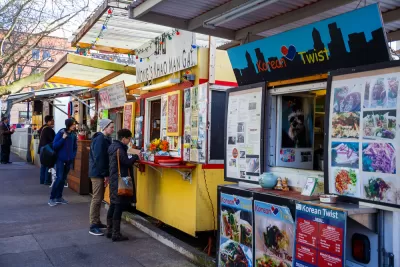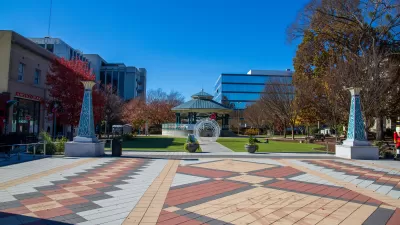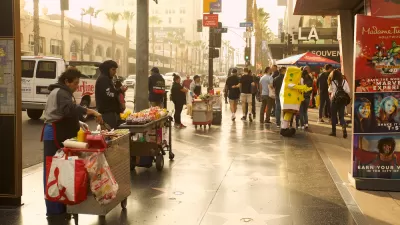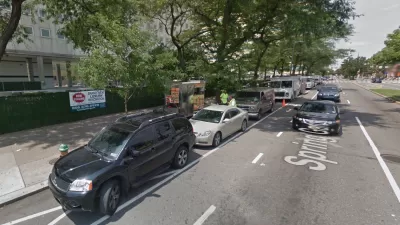Several big stories, all rolled into one, are emerging in Portland. Changes in zoning have paved the way for high-rises that are proposed for the existing location of the city's famous food stalls.

First came the news, via Luke Hammill, that "[i]n between local landmarks like Voodoo Doughnut, Skidmore Fountain and the Portland Saturday Market, the Goodman family hopes to nestle 11 new buildings, $1.5 billion in investment, a grocery store and an untold number of new office workers, shoppers and residents." The Ankeny Blocks development, as its currently called, is proposed "in anticipation of zoning changes the city plans to make that would allow developers to build taller buildings downtown."
All by itself, the development proposal would be one of the Pacific Northwest's biggest planning and urbanism stories, thanks to the new building height, proposed for an already bustling and treasured neighborhood, resulting from a change to the zoning code for the downtown area. Hammill provides more details on the proposed development, as well as insight into the implications and importance of the new development and the land use regulation changes, from Ethan Seltzer, Portland State University professor of urban studies and the former president of the city's planning commission.
Matthew Korfhage picked up on a different story within that story, however, noting that the development plans would displace three of Portland's "most central food cart pods—including its oldest…" A point not discussed in Hammill's article is that some of the surface parking lots targeted for the Ankeny Blocks are currently food cart pods.
According to Korfhage, "Brett Burmeister at Food Carts Portland was the first to take note of the three pods amid the planned developments." Burmeister also issued a call to action for food cart owners and their fans: "Food cart owners need to come together and get in front of City Council and let them know that Portland street food scene is part of the city fabric. Every city has it, so as we develop, we need to find a way to keep it."
FULL STORY: 11 new buildings, $1.5 billion in investment planned for downtown Portland

Maui's Vacation Rental Debate Turns Ugly
Verbal attacks, misinformation campaigns and fistfights plague a high-stakes debate to convert thousands of vacation rentals into long-term housing.

Planetizen Federal Action Tracker
A weekly monitor of how Trump’s orders and actions are impacting planners and planning in America.

In Urban Planning, AI Prompting Could be the New Design Thinking
Creativity has long been key to great urban design. What if we see AI as our new creative partner?

King County Supportive Housing Program Offers Hope for Unhoused Residents
The county is taking a ‘Housing First’ approach that prioritizes getting people into housing, then offering wraparound supportive services.

Researchers Use AI to Get Clearer Picture of US Housing
Analysts are using artificial intelligence to supercharge their research by allowing them to comb through data faster. Though these AI tools can be error prone, they save time and housing researchers are optimistic about the future.

Making Shared Micromobility More Inclusive
Cities and shared mobility system operators can do more to include people with disabilities in planning and operations, per a new report.
Urban Design for Planners 1: Software Tools
This six-course series explores essential urban design concepts using open source software and equips planners with the tools they need to participate fully in the urban design process.
Planning for Universal Design
Learn the tools for implementing Universal Design in planning regulations.
planning NEXT
Appalachian Highlands Housing Partners
Mpact (founded as Rail~Volution)
City of Camden Redevelopment Agency
City of Astoria
City of Portland
City of Laramie





























